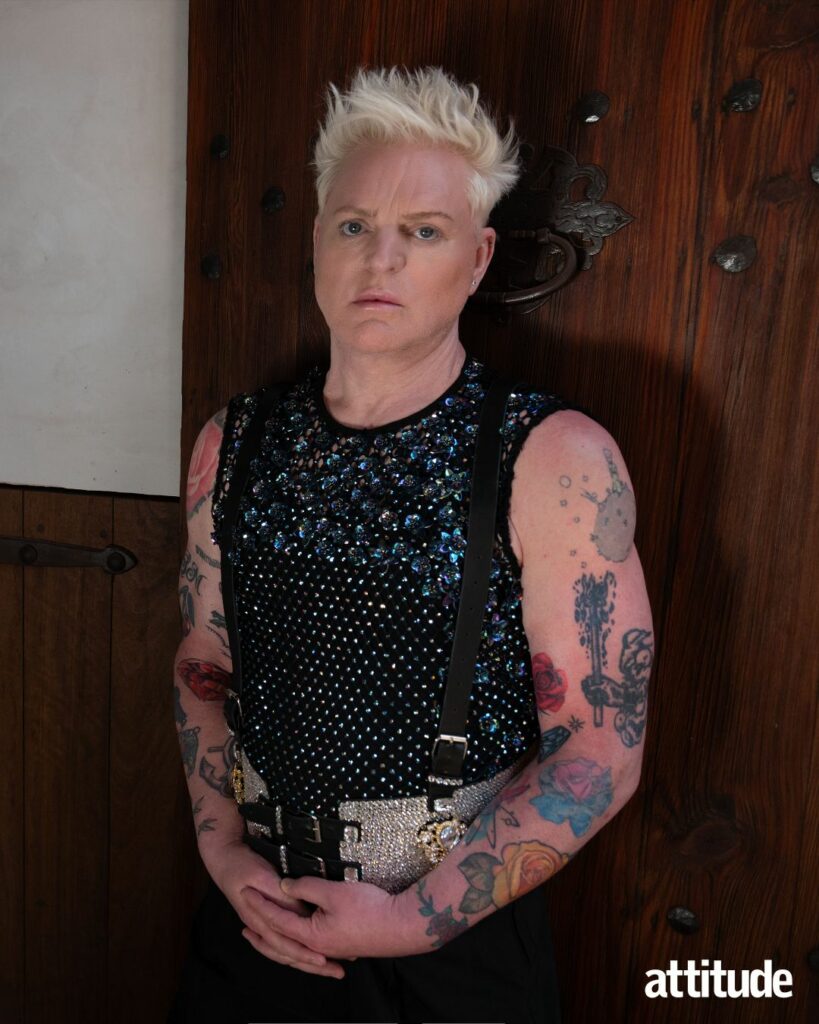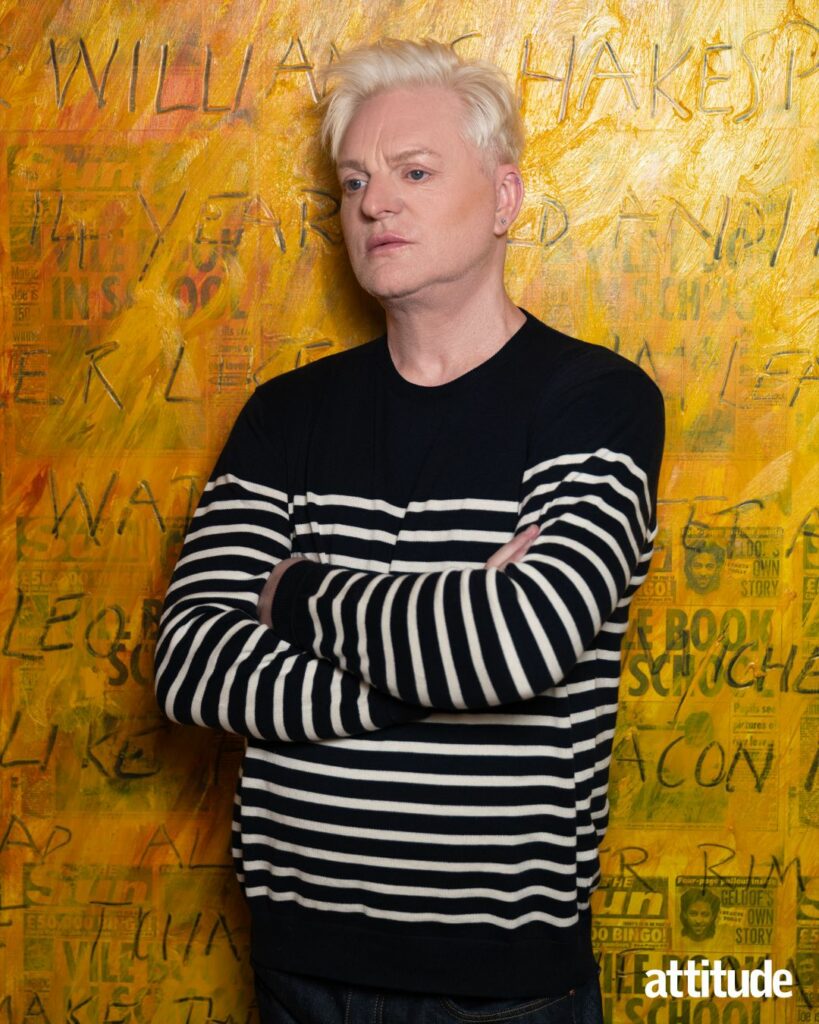Erasure’s Andy Bell on 40-year career: ‘If someone told me to tone it down, I’d camp it up’ (EXCLUSIVE)
The pop legend has been honoured as a Pride ICON at the PEUGEOUT Attitude PRIDE Awards Europe 2025, supported by British Airways
By Dale Fox
“I’ve never had a problem with being open,” says Andy Bell. “I wear my heart on my sleeve.”
It’s a simple statement, but one that has defined a career. This, and the spirit of Erasure’s great gay anthems, is why he is one of our Pride ICON winners at this year’s PEUGEOT Attitude PRIDE Awards Europe, supported by British Airways.
From the moment he stepped into the spotlight with Erasure in the mid-80s, Bell made the choice to live visibly and truthfully as a gay man. That decision, made in the shadow of Section 28 and a hostile tabloid press, was quietly radical. And for thousands of fans watching on, life-changing. “From the very first interview, I said I was gay and I had a boyfriend. That was it.”
We meet in a London hotel after Bell has been doing press for his latest solo album, Ten Crowns, a dance-filled, introspective project shaped by decades of songwriting and spiritual reflection. “It’s named after a tarot reference,” he says. “The 10 crowns on the Kabbalah’s tree of life – different stages you go through. Love, hate, enlightenment.” His husband Stephen brings him a glass of white wine as we sit down, knee-to-knee, at the end of a long coffee table. Around us, guests drink their flat whites, seemingly unaware that a pop legend is holding court nearby.
“In the clubs was where I got my education” – Andy Bell
“I wanted it to be dance,” Bell says of the record between sips. “In the clubs was where I got my education, from watching drag queens, from how they dealt with the crowd.”
Bell grew up in Peterborough with his brother and four sisters. “I played with their dolls and learnt all my habits from my sisters. I was quite girly, so I got called a girl a lot.” At school, he kept away from boys his own age. “I was scared of them. I used to walk the long way to avoid where I knew they’d be waiting for me.”
He moved to London in his early twenties with a girlfriend, who ended up helping him come out. “She took me to my first gay bar – the Embassy Club – and she’d wait for me in the car. She really helped me.”
“People would say, ‘Don’t shove the gay thing down people’s throats'” – Andy Bell
When Erasure formed in 1985, Bell made a conscious choice: no pretending. He remembers asking fellow singer Tom Robinson for advice on coming out in music. “He told me he wore a pink triangle so people would ask. I thought, ‘If anyone asks questions about my sexuality, I’ll just be truthful, then.’”
But Bell’s honesty wasn’t always welcome. “People would say, ‘Don’t shove the gay thing down people’s throats.’ But I’d go the opposite way. If someone told me to tone it down, I’d camp it up.”

He laughs as he recalls one of his favourite stage looks, during 1992’s phantasmagorical Entertainment Tour, where Elton John, Jean Paul Gaultier and Boy George were among the famous glamour names to attend. “Vivienne Westwood 12-inch red PVC shoes, Calvin Klein pants, a corset. I felt fabulous. That was peak. I always had a Judy moment too – I’d end with ‘Over the Rainbow’.”
“It got to the point where it was do or die”
In 1998, Bell was diagnosed with HIV. “I kind of knew already,” he says. “I was getting ill. I was in denial for a long time. Then it got to the point where it was do or die.” After starting treatment, he shared his diagnosis publicly with a post on Erasure’s website in 2004.
Not knowing what the public reaction would be, he recalls stepping on stage to perform afterwards and seeing the whole audience rise to their feet to applaud him. “I was scared [before going on stage], so I was like, ‘Oh my God.’”
That moment has stayed with him – as has the power of visibility. “I don’t know if I’d consider myself an activist, but I think the very mere fact of being visible is, to me, activist enough,” he says. And for many fans, that message found its clearest voice in the Erasure track ‘A Little Respect’. “I wrote it during the [Section 28] period and I had a feeling of being fed up of all these people telling me what to do, telling me how to live my life. And you’re just like, ‘Keep your nose out – it’s none of your business.’”
“If it’s consensual, just live your life” – Andy Bell
This instinct – to push back gently, but firmly – also runs through his spiritual worldview. “I’m more into paganism than anything else [spiritual]. Nature. Just being somewhere beautiful and seeing animals and how they interact. Spirituality to me is about how you feel with other people and having respect for other people and allowing everyone to live their lives. If they’re not harming anyone, if it’s consensual, just live your life.”
Bell’s belief in letting people live truthfully also shapes how he views his role today as a queer icon, he says, self-effacingly, who is “probably only recognised by the mums and dads these days!”

“When I go home… we’re in the pub with my dad and my sisters. And then all of a sudden, some big bruising straight bloke will come up and put his arms around me and say, ‘Oh, love you mate.’”
“That’s what making music is all about for me. Making it OK for people in these small towns [to be themselves].”
Today, as he prepares to spread queer joy across the world with Ten Crowns, Bell is still playing to the rhythm that began during those early London club nights which helped him discover who he was. Four decades after choosing to live proudly out front, he remains proud by not inviting anyone who needs it to step into the light with him.
